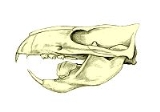
Ptilodontidae
Encyclopedia
Ptilodontidae is a family of primitive mammal
s within the extinct order Multituberculata
. Representatives are known from the Upper Cretaceous
and Paleocene
of North America
.
The Ptilodontidae family was originally named Ptilodontinae and classified as a subfamily by Edward Drinker Cope
in 1887. It was amended by Gregory and Simpson in 1926 to its current status.
In addition, Cope mistakenly classified the Ptilodus genus
as a marsupial
. He originally named it Chirox, and placed it in the new family Chirogidae in 1887. Since it has been reclassifed, and Chirogidae is now officially a synonym
of Ptilodontidae.
One of the most outstanding features of this family of squirrel-like, arboreal mammals, was the peculiar shape of their last lower premolar
. It was larger and more elongated than its neighbours, and its occlusive
surface was formed into a serrated slicing blade. Most likely this tooth was used for crushing and opening seeds and nuts, but it is believed that the ptilodonts, like most small multituberculates, supplemented their diet with insects, worms, and fruits.
Mammal
Mammals are members of a class of air-breathing vertebrate animals characterised by the possession of endothermy, hair, three middle ear bones, and mammary glands functional in mothers with young...
s within the extinct order Multituberculata
Multituberculata
The Multituberculata were a group of rodent-like mammals that existed for approximately one hundred and twenty million years—the longest fossil history of any mammal lineage—but were eventually outcompeted by rodents, becoming extinct during the early Oligocene. At least 200 species are...
. Representatives are known from the Upper Cretaceous
Cretaceous
The Cretaceous , derived from the Latin "creta" , usually abbreviated K for its German translation Kreide , is a geologic period and system from circa to million years ago. In the geologic timescale, the Cretaceous follows the Jurassic period and is followed by the Paleogene period of the...
and Paleocene
Paleocene
The Paleocene or Palaeocene, the "early recent", is a geologic epoch that lasted from about . It is the first epoch of the Palaeogene Period in the modern Cenozoic Era...
of North America
North America
North America is a continent wholly within the Northern Hemisphere and almost wholly within the Western Hemisphere. It is also considered a northern subcontinent of the Americas...
.
The Ptilodontidae family was originally named Ptilodontinae and classified as a subfamily by Edward Drinker Cope
Edward Drinker Cope
Edward Drinker Cope was an American paleontologist and comparative anatomist, as well as a noted herpetologist and ichthyologist. Born to a wealthy Quaker family, Cope distinguished himself as a child prodigy interested in science; he published his first scientific paper at the age of nineteen...
in 1887. It was amended by Gregory and Simpson in 1926 to its current status.
In addition, Cope mistakenly classified the Ptilodus genus
Genus
In biology, a genus is a low-level taxonomic rank used in the biological classification of living and fossil organisms, which is an example of definition by genus and differentia...
as a marsupial
Marsupial
Marsupials are an infraclass of mammals, characterized by giving birth to relatively undeveloped young. Close to 70% of the 334 extant species occur in Australia, New Guinea, and nearby islands, with the remaining 100 found in the Americas, primarily in South America, but with thirteen in Central...
. He originally named it Chirox, and placed it in the new family Chirogidae in 1887. Since it has been reclassifed, and Chirogidae is now officially a synonym
Synonym
Synonyms are different words with almost identical or similar meanings. Words that are synonyms are said to be synonymous, and the state of being a synonym is called synonymy. The word comes from Ancient Greek syn and onoma . The words car and automobile are synonyms...
of Ptilodontidae.
One of the most outstanding features of this family of squirrel-like, arboreal mammals, was the peculiar shape of their last lower premolar
Premolar
The premolar teeth or bicuspids are transitional teeth located between the canine and molar teeth. In humans, there are two premolars per quadrant, making eight premolars total in the mouth. They have at least two cusps. Premolars can be considered as a 'transitional tooth' during chewing, or...
. It was larger and more elongated than its neighbours, and its occlusive
Occlusion (dentistry)
Occlusion, in a dental context, means simply the contact between teeth. More technically, it is the relationship between the maxillary and mandibular teeth when they approach each other, as occurs during chewing or at rest....
surface was formed into a serrated slicing blade. Most likely this tooth was used for crushing and opening seeds and nuts, but it is believed that the ptilodonts, like most small multituberculates, supplemented their diet with insects, worms, and fruits.

